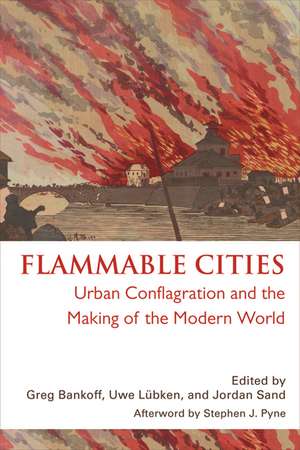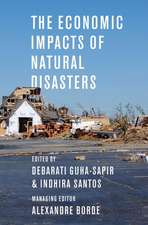Flammable Cities: Urban Conflagration and the Making of the Modern World
Editat de Greg Bankoff, Uwe Lübken, Jordan Sand Cuvânt după de Stephen J. Pyneen Limba Engleză Paperback – 18 ian 2012
In most cities today, fire has been reduced to a sporadic and isolated threat. But throughout history the constant risk of fire has left a deep and lasting imprint on almost every dimension of urban society. This volume, the first truly global study of urban conflagration, shows how fire has shaped cities throughout the modern world, from Europe to the imperial colonies, major trade entrepôts, and non-European capitals, right up to such present-day megacities as Lagos and Jakarta. Urban fire may hinder commerce or even spur it; it may break down or reinforce barriers of race, class, and ethnicity; it may serve as a pretext for state violence or provide an opportunity for displays of state benevolence. As this volume demonstrates, the many and varied attempts to master, marginalize, or manipulate fire can turn a natural and human hazard into a highly useful social and political tool.
Preț: 259.92 lei
Nou
Puncte Express: 390
Preț estimativ în valută:
49.74€ • 52.06$ • 41.40£
49.74€ • 52.06$ • 41.40£
Carte tipărită la comandă
Livrare economică 31 martie-14 aprilie
Preluare comenzi: 021 569.72.76
Specificații
ISBN-13: 9780299283841
ISBN-10: 0299283844
Pagini: 368
Ilustrații: 39 b-w illus.
Dimensiuni: 152 x 229 x 25 mm
Greutate: 0.57 kg
Ediția:1
Editura: University of Wisconsin Press
Colecția University of Wisconsin Press
ISBN-10: 0299283844
Pagini: 368
Ilustrații: 39 b-w illus.
Dimensiuni: 152 x 229 x 25 mm
Greutate: 0.57 kg
Ediția:1
Editura: University of Wisconsin Press
Colecția University of Wisconsin Press
Recenzii
“A remarkably robust survey of cultures, cities, and histories that affirms the universality of fire’s impact within the urban setting.”—Stephen J. Pyne
“How do people in an urban environment deal with the problem of fire? The essays in this book show how the answers vary depending on economic conditions, power structures, climate, and culture. An excellent collection.”—Johan Goudsblom, author of Fire and Civilization
Notă biografică
Greg Bankoff is professor of history at the University of Hull, UK. Uwe Lübken is “Disaster Migration” project director, Rachel Carson Center for Environment and Society, LMU Munich. Jordan Sand is associate professor of Japanese history and culture at Georgetown University.
Cuprins
Acknowledgments
Introduction
Part 1: Cities as Fire Regimes
1 Jan van der Heyden and the Origins of Modern Firefighting: Art and Technology in Seventeenth-Century Amsterdam
Susan Donahue Kuretsky
2 Governance, Arson, and Firefighting in Edo, 1600–1868
Jordan Sand and Steven Wills
3 Taming Fire in Valparaíso, Chile, 1840s–1870s
Samuel J. Martland
4 The Burning of a Modern City? Istanbul as Perceived by the Agents of the Sun Fire Office, 1865–1870
Cornel Zwierlein
5 Imperial Russia’s Urban Fire Regimes, 1700–1905
Cathy A. Frierson
6 Fighting Fires (or Not) in Porfirian Mexico
Amy S. Greenberg
Part 2: Fire as Risk and as a Catalyst of Change
7 The Great Fire of Lisbon, 1755
Mark Molesky
8 A Tale of Two Cities: The Pyro-Seismic Morphology of Nineteenth-Century Manila
Greg Bankoff
9 Fire and Urban Morphogenesis: Patterns of Destruction and Reconstruction in Nineteenth-Century Montreal
Jason Gilliland
10 The Great Fire of Hamburg, 1842: From Catastrophe to Reform
Dirk Schubert
11 Did the Fire Insurance Industry Help Reduce Urban Fires in the United States in the Nineteenth Century?
Sara E. Wermiel
12 Inflaming the Fears of Theatergoers: How Fires Shaped the Public Sphere in Buenos Aires, Argentina, 1880–1910
Kristen McCleary
13 Points of Origin: The Social Impact of the 1906 San Francisco Earthquake and Fire
Andrea Rees Davies
Part 3: The Politics of Fire
14 The Politics of Singapore’s Fire Narrative
Nancy H. Kwak
15 The Beirut Central District on Fire: Firefighting in a Divided City with Shifting Front Lines, 1975–1976
Sofia Toufic Shwayri
16 Who Burned Cleveland, Ohio? The Forgotten Fires of the 1970s
Daniel Kerr
17 “There Is More to This Fire Than Meets the Eye”: Anatomy of Fire Outbreaks in Lagos, Nigeria, 1980–2008
Ayodeji Olukoju
18 Fires, Urban Environments, and Politics in Contemporary Jakarta
Jérôme Tadié
Afterword: Fire on the Fringe
Stephen J. Pyne
Contributors
Index
Descriere
In most cities today, fire has been reduced to a sporadic and isolated threat. But throughout history the constant risk of fire has left a deep and lasting imprint on almost every dimension of urban society. This volume, the first truly global study of urban conflagration, shows how fire has shaped cities throughout the modern world, from Europe to the imperial colonies, major trade entrepôts, and non-European capitals, right up to such present-day megacities as Lagos and Jakarta. Urban fire may hinder commerce or even spur it; it may break down or reinforce barriers of race, class, and ethnicity; it may serve as a pretext for state violence or provide an opportunity for displays of state benevolence. As this volume demonstrates, the many and varied attempts to master, marginalize, or manipulate fire can turn a natural and human hazard into a highly useful social and political tool.





